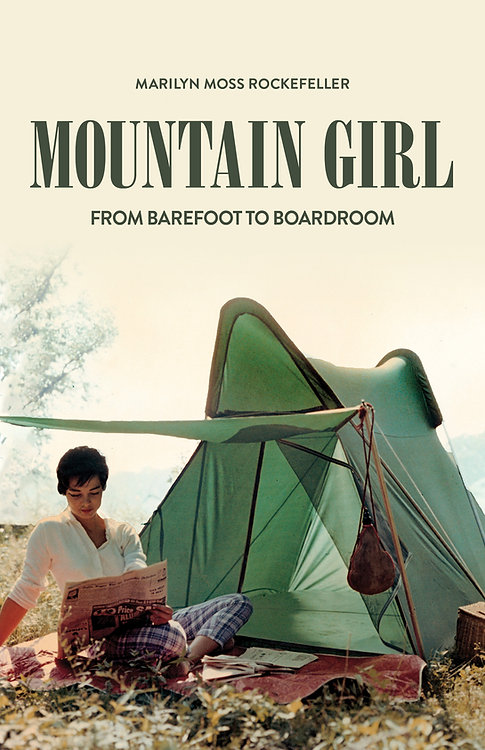What do we keep with us when everything around us is changing? In her story Mountain Girl, Marilyn Moss Rockefeller answers that nothing changes unless you allow it to, you are you and that is carried with you forever. This is the very thought I had as I closed this wonderful memoir.
 Rockefeller is also the author of the award-winning book Bill Moss: Fabric Artist & Designer. Her essays have appeared in a number of publications. She cofounded Moss Tent Works with Bill Moss in 1975 and served as president and CEO of Moss, Inc. until 2001. She lives with her husband, James Rockefeller Jr., who published his own memoir in 2018, titled Wayfarer. They live in Camden.
Rockefeller is also the author of the award-winning book Bill Moss: Fabric Artist & Designer. Her essays have appeared in a number of publications. She cofounded Moss Tent Works with Bill Moss in 1975 and served as president and CEO of Moss, Inc. until 2001. She lives with her husband, James Rockefeller Jr., who published his own memoir in 2018, titled Wayfarer. They live in Camden.
In the book’s acknowledgement, after thanking those who helped with the book’s publication, Rockefeller leaves a “note” from writer to reader: “Further, I thank you, my reader, for giving this book a chance, with the hope that you will not only like it but find something that resonates for you here in these stories about facing our fears and daring to do that which most calls us.”
The sentiment is appropriate because within that note of thanks, the essence of this book — its purpose, the author’s intent — is held. We should all move through life with the strength of purpose and face our fears no matter the cost. Through vivid storytelling, this memoir about a woman who did just that is a testament that anything can be achieved.
This memoir was a surprise. Having known the Rockefeller name, I never knew about the artistry of Bill Moss, his designs, Moss Tent Works nor that the company was co-founded, built and eventually sold by a woman at a time when women in the corporate world were a rare sight. The grit and determination that seeps from every page carried me along on a sometimes “rough and tumble ride” softened often by quiet interludes of emotional storytelling.
Her story starts in the foothills of West Virginia. As a little girl, “MarilynRae” (her father adding the “Rae”) grows up on her grandparent’s farm in the Appalachia town of Elgood. Through her childhood years Rockefeller embraces an impoverished life by spending her days climbing trees, shooting squirrels for dinner and breaking the rules from time to time. It was a life also rich in the moments she shared with the people that came and went on the farm, including her mom and dad.
For her that farm was a world unto itself. As the years would pass Rockefeller would find herself returning, “to that small Appalachian farm in my mind and to the strength and sense of wholeness I had there.”
A life lesson she learned early on from her grandparents comes from a framed, hand-stitched aphorism that hung over the kitchen table: “Back then, at my young age, I’m not sure I knew what this saying really meant. But I now realize that my grandparents lived by these words. They were kind, giving people. Listeners instead of talkers. ‘Little behooves any of us, to find fault in the rest of us’ — a saying that I would also come to live by.”
Over time the tomboy grows up experiencing significant life events that Rockefeller adeptly tells in an almost short story-like fashion. Her words are like that of a paintbrush, often subtle, sometimes bold, like when her parents separate, and later when she is told her father had died.
After the death of her father, Rockefeller moves north and in a sense is transformed by her mother — an educator who gradually moved north over the years — from a “mountain girl” to a city girl. She attends high school in Connecticut, then moves to Michigan, attends college and meets designer Bill Moss. They marry and, with two children in tow, make their way to Maine, where the company Moss Tents is eventually born. Business struggles take their toll; a marriage ends; a business is saved then sold; and she meets and marries James “Pebble” Rockefeller.
It is an incredible journey of adventure, struggle, loss, love found, lost, then found again. Through it all Rockefeller maintains that sense of self she garnered back on her grandparent’s farm. It is a life saturated by experience and a must-read for anyone seeking a truly inspirational story.
As she closes out this memoir of a life “well-lived,” Rockefeller reflects back to when she began “writing it all down.” In doing so she realizes she had come full circle, moving away from finding herself through others to being herself. Over time she listened to her voice and did what her heart told her to do, without judging or finding fault in others, just like that stitched saying above the kitchen table.
“I saw myself then on the porch swing in Elgood — a little spirited, fearless MarilynRae. The mountain girl who always sought belonging had grown up. She now had her own courage and strength.” And as any good story will do, I, too, in the end found myself sharing that porch swing with MarilynRae as both a reader and now her friend.
Islandport Press, 2022, softcover, $18.95
© 2023 RJ Heller
First Published: The Quoddy Tides, January 27, 2023 : Machias Valley News Observer, February 15, 2023: Calais Advertiser, February 16, 2023: Bangor Daily News, February 20, 2023

0 Comments